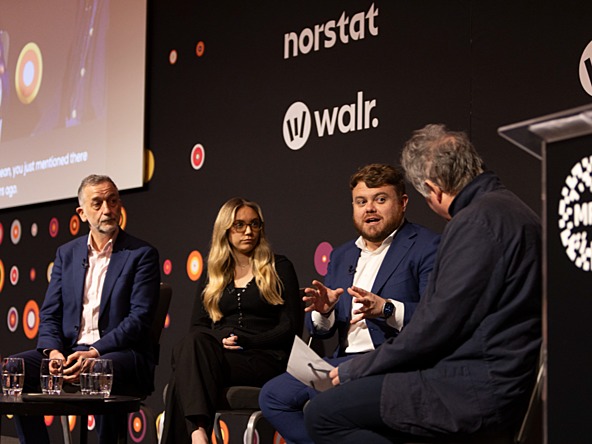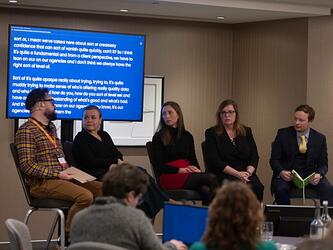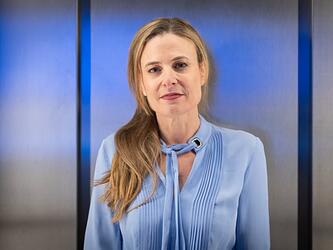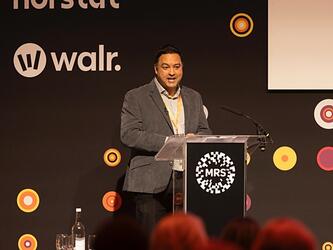Disinformation offering ‘simple solutions’ to complex issues, MRS conference hears

Speaking on a panel about disinformation, Chris Morris, chief executive at Full Fact, said that in a complex world, the loss of faith in sources of information was a major issue that risked completely changing societies.
“One of our big challenges is we are in danger of rapidly approaching a point where nobody believes anything they read, see or hear anywhere,” Morris said. “I think we all know the reason why this is happening: the tsunami of information, good and bad, that is coming towards us.
“If we do get to that point – and let’s face it, at the moment the bad guys are winning – then that has profound implications for our political system and the companies you all represent.
“If people don’t believe you, they won’t trust you, and if you have no trust, you have no consent, and they certainly won’t believe in any brand you are trying to push on them as they don’t believe anything anymore. I think anyone who cares about data, evidence and accuracy has to really care about this.”
Morris said that conspiracy theories have an allure due to the complexity of the world people now live in and how fast society is changing.
“The conspiracy theory is the trail of breadcrumbs through the forest – it gives you a simple answer in a complex world,” Morris explained. “It also gives you, online, a family of friends who believe the same things you do.
“It has been hardwired into our DNA over generations – we learn from stories, and that’s why they are so powerful. Let’s talk about feelings and stories, but let’s make sure those debates are based on factual information.”
He added that there needs to be a balance between freedom of expression and preventing harm online.
“Scepticism is good. But there is a line that can be crossed from scepticism into believing in things that are disturbing or harmful,” Morris added.
“The balance between protecting freedom of expression and protecting people from harm online is a really difficult balance to get right. We are allowing the most powerful companies in human history to regulate themselves.
“How do you responsibly regulate information while protecting freedom of expression? There are no easy answers to it.”
Donie O’Sullivan, senior correspondent at CNN Worldwide, told the panel that “feelings are far more powerful than facts” and conspiracy theories tap into that idea and appeal to people’s emotions and searches for solutions.
“People are often searching for information because they are desperate,” he said. “People are struggling.
“People are searching for why things are so bad, and there is an appeal from misinformation that says ‘here is the reason and here are the people you need to blame’. Oftentimes, conspiracy theories offer very concise answers to very difficult questions.”
Newsrooms need to look at whether they are helping or hindering people’s understanding of the world by reporting on conspiracy theories, O’Sullivan added, admitting that “there’s not an exact science on that”.
He cited the example of Q-Anon, which he said CNN was reluctant to cover as it was deemed “too fringe” to report on, but then it moved mainstream in 2021. “That’s an instance where we didn’t engage soon enough,” O’Sullivan admitted.
Hebe Campbell, video journalist and presenter at The Independent, said part of the issue was that conspiracy theories were being catalysed by social media.
“Social media is being used to spread [misinformation and disinformation] at a speed we’ve never seen before,” Campbell explained. “Conspiracy theories, which is where misinformation often begins, started and were once fringe movements, and what social media has done is not only brought it not only mainstream but actually start to cause real confusion among the public about certain things.”
Using the example of Instagram, Campbell said that more work was needed to help young people know how to spot misinformation online.
“Now, 15 years on, 90% of content I interact with [on Instagram] is algorithm pushed on me and also created by content creators that I don’t know. What hasn’t caught up is media literacy in young people.”
She said that media literacy needed updating to take into account that people are finding news on social media and following and trusting influencers, and need to know where to get information from and learn who to trust.
Chairing and moderating the panel, Crawford Hollingworth, co-founder at The Behavioural Architects, said that researchers had a key role to play.
“We need to distinguish between fact and opinions,” he said. “As an industry that depends on accurate insight and data, it is our job to do that and it is our privilege to do that.
“Mis- and disinformation is infiltrating research data every single day and the insights we provide.”
Watch the full session here:

We hope you enjoyed this article.
Research Live is published by MRS.
The Market Research Society (MRS) exists to promote and protect the research sector, showcasing how research delivers impact for businesses and government.
Members of MRS enjoy many benefits including tailoured policy guidance, discounts on training and conferences, and access to member-only content.
For example, there's an archive of winning case studies from over a decade of MRS Awards.
Find out more about the benefits of joining MRS here.














0 Comments